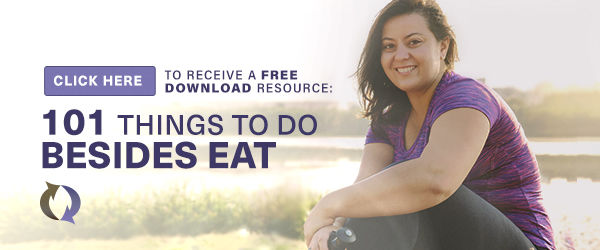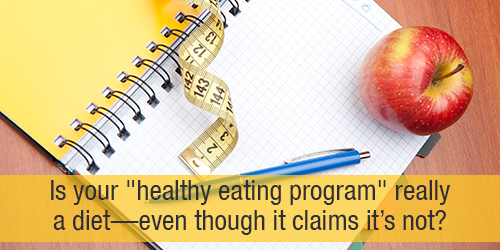Be aware! In an effort to catch the rising anti-diet tide, many diets now claim they are “not a diet.” But to the trained eye, they clearly are. Just saying they aren’t doesn’t make it so, and therefore the results are likely to be the same: an unsustainable program you start and stop repeatedly. And increasingly, diet culture claims to be about wellness, but nothing has really changed (dubbed The Wellness Diet by Christy Harrison, MPH, RD, CDN). So here are some signs your eating plan is really a diet.
Is your “healthy eating program” really a diet?
Below are some of the telltale signs that a healthy eating plan, wellness program, or “lifestyle change” is actually a diet—even if it claims it’s not.
(Note: If you feel skeptical, defensive, or critical as you read this list, take note! Your paradigm is showing.)
- The focus is on weight loss rather than well-being (or well-being is contingent on being a “healthy weight”).
- They claim to be about wellness, but the methods require restriction—such as the limitation of the intake of a certain food, macronutrient, or ingredient).
- You’re supposed to log everything you eat for accountability.
- There is weighing, measuring, or counting involved: calories, exchanges, points, grams, pounds, etc.
- You have to plan your meals in advance or follow a predetermined meal plan.
- Foods are labeled as good/bad, red light/green light, allowed/not allowed, or other dichotomous labels.
- “They” say you can “eat what you love,” but then they tell you what, when, or how much.
- Food is provided for you.
- You eat substitutes for real food (shakes, bars, supplements).
- Some are based on an addiction model and require restriction, avoidance, or abstinence.
- Alternatively, you’re “allowed” to “eat whatever you want,” but the diet or expert determines the limits for you.
- Certain foods are considered indulgences, treats, or splurges, and are therefore made special and even more desirable.
- There are “cheat” days or “free” days.
- There are arbitrary rules about when to eat, like “don’t eat after seven” or “eat every three hours.”
- Minutes of exercise are converted to calorie or food equivalents.
- Exercise is used to earn food or pay penance for eating something “bad,” in other words, physical activity becomes punishment for eating.
- There is a weight loss phase and a maintenance phase (in other words, you’ll be on this diet for the rest of your life).
- Rules, willpower, incentives, awards, tricks, and motivation help temporarily, but repeated “treatment” is necessary to maintain the results.
- While you are “on” it, you find yourself thinking about food frequently.
- You feel guilty for certain choices you’ve made.
- You crave or miss foods that are restricted or forbidden.
- You have to avoid certain places, people, or events because of the “temptations.”
- When you eventually “give in” and eat the foods you miss or crave, you find yourself overeating those foods. (Read What does overeating mean?)
- You resort to eating differently in private than you do in public to avoid comments, judgment, and criticism.
- You overdiet the way you overeat: thinking and talking about food all the time.
- There are subtle implications that you can’t be trusted with food, so you need their externally-imposed limits.
And why does it matter? Because the evidence shows that diets don’t work long term and can lead to weight cycling, disordered eating, and weight stigma. Don’t be fooled by a wolf in sheep’s clothing.
Explore mindful eating instead!
This article was updated from a previous version.
If you enjoyed this article, here are three more to help you:
Diet culture: An outdated paradigm whose time is up!
What is your motivation to change your diet?
Diet and Activity Trackers: The Next Generation of Misused Tools


